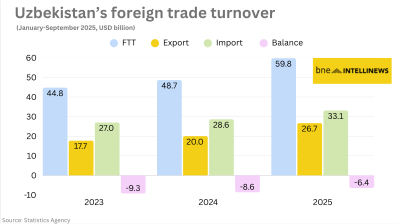Germany's IFO Business Climate Index edged lower in August, marking the fourth consecutive month of decline, as sentiment in the manufacturing and services sectors worsened, Oxford Economics reported on August 26.
The index fell by 0.4 points to 86.6, its lowest level since February, with the current assessment of business conditions dropping, while expectations remained largely unchanged.
The “engine of Europe’s economy” is spluttering as Germany has been hit with multiple problems thanks to the ongoing polycrisis.
The decline in the IFO index aligns with recent economic indicators, including last week's disappointing flash PMI data, which suggested ongoing challenges in Europe’s powerhouse. The August dip, however, was less severe than some analysts had anticipated, offering a sliver of relief amid broader concerns about Germany's economic health.
"Today's IFO print came as no surprise after last week's gloomy PMI data," Oxford Economics analysts noted. "We think it will take Germany's manufacturing sector until the end of this year to emerge from the economic slump, but the deterioration in the services sector highlights the broad weakness in the German economy."
The IFO index's expectations component was nearly unchanged at 86.8, while the current assessment component fell by 0.6 points to 86.5. This steady decline underscores the uneven path towards economic recovery, with sentiment particularly bleak across manufacturing and services, where demand is weakening and the outlook remains negative.
"At the sectoral level, sentiment deteriorated in manufacturing and services as survey respondents reported weaker demand and an increasingly negative outlook," Oxford Economics analysts added. The trade sector, however, showed a modest recovery in expectations, providing a slight contrast to the overall negative trend.
Despite the continued decline in business sentiment, analysts remain cautiously optimistic about a gradual recovery by the end of the year. "Early indicators of economic activity in Germany have declined recently, and although they remain above the dismal levels seen last year, we expect the economic recovery to be delayed with some repercussion for the labour market, a trend visible across the eurozone," they said. "But we maintain that a recovery will ensue towards the end of this year on the back of a turning industrial cycle and easing financial conditions."
Last week's data on negotiated wage growth and expectations of falling inflation have bolstered hopes for economic improvement. "This paves the way for the ECB to cut rates twice this year, followed by a series of cuts next year," the analysts suggested. "Although the full impact of monetary policy will be felt with a delay, this should provide some tailwind for an economic recovery after signs of overtightening have strengthened recently."
Overall, while the current economic indicators present a challenging outlook, there is a growing consensus that the German economy may see modest growth in the third quarter, though a contraction cannot be ruled out.
Data

Polish retail sales return to solid growth in September
Polish retail sales grew 6.4% year on year in constant prices in September, picking up from a 3.1% y/y rise in August, the statistics office GUS said.

Uzbekistan’s nine-month foreign trade nears $60bn
Export growth of 33% and import expansion of 16% y/y produce $6.4bn deficit.

Hungary’s central bank leaves rates unchanged
National Bank of Hungary expects inflation to fall back into the tolerance band by early 2026, with the 3% target sustainably achievable in early 2027 under the current strict policy settings.

Germany slowdown weighs on Lithuania’s export-driven manufacturing sector
Lithuania’s economy remains highly sensitive to the industrial cycle in Germany, its third largest trade partner.




